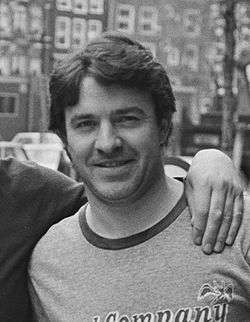 Robertson in 1980 | |||
| Personal information | |||
|---|---|---|---|
| Full name | John Neilson Robertson [1] | ||
| Date of birth | 20 January 1953 [1] | ||
| Place of birth | Viewpark, [2] Lanarkshire, Scotland | ||
| Position | Left winger | ||
| Senior career* | |||
| Years | Team | Apps | (Gls) |
| 1970–1983 | Nottingham Forest | 386 | (61) |
| 1983–1985 | Derby County | 72 | (3) |
| 1985–1986 | Nottingham Forest | 11 | (0) |
| Total | 469 | (64) | |
| International career | |||
| 1978–1983 | Scotland | 28 | (8) |
| * Club domestic league appearances and goals | |||
John Neilson Robertson (born 20 January 1953) is a Scottish former professional footballer. He provided the assisting cross for Trevor Francis to score the only goal when Nottingham Forest won the 1979 European Cup Final. A year later he scored when Forest retained the trophy, this time against Hamburger SV. At Forest he also won promotion from the 1976–77 Football League Second Division, the 1977–78 Football League First Division, the UEFA Super Cup, two Football League Cups, the 1978 FA Charity Shield and the Anglo-Scottish Cup.
Contents
- Playing career
- Nottingham Forest (first spell)
- Later playing career
- Coaching career
- Legacy
- Personal life
- Career statistics
- Club
- International
- International goals
- Honours
- References
- External links
He also played for Scotland, scoring the winning goal against England in 1981 and against New Zealand in the 1982 FIFA World Cup.
He has since moved into coaching, acting as assistant to his former Nottingham Forest teammate Martin O'Neill. Robertson's last role was assistant manager at Aston Villa between 2006 and 2010.